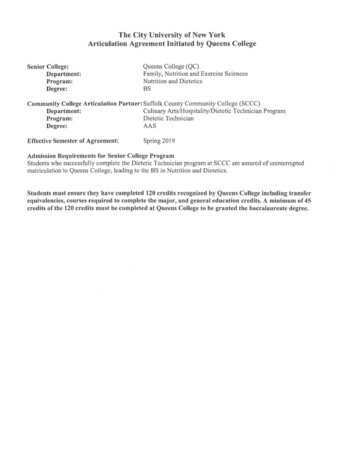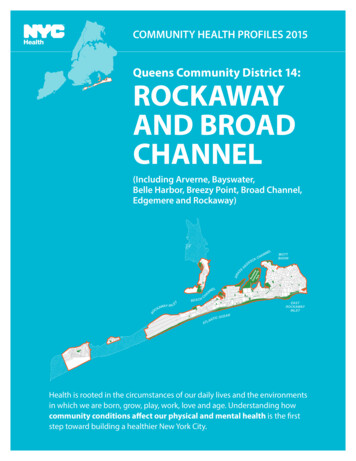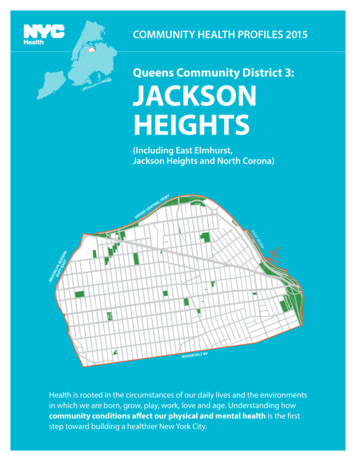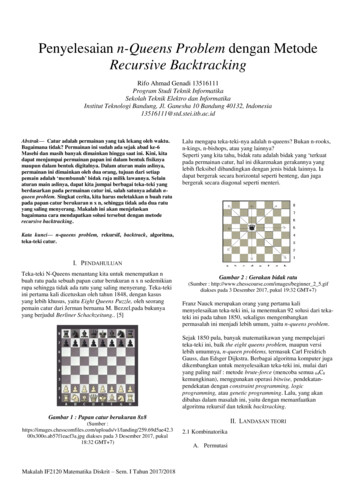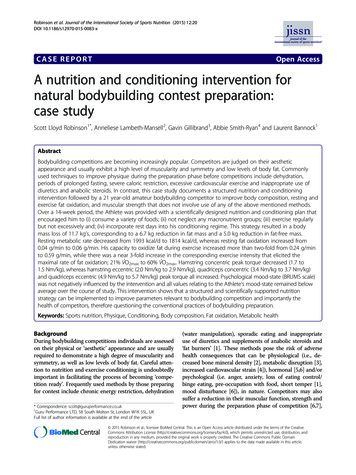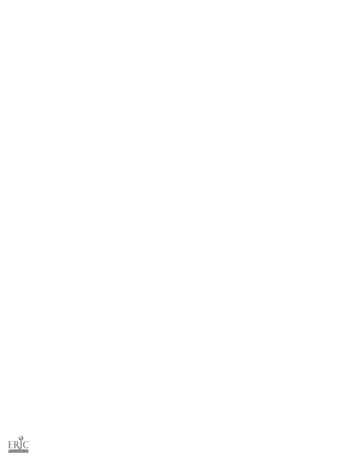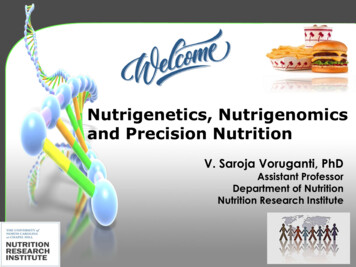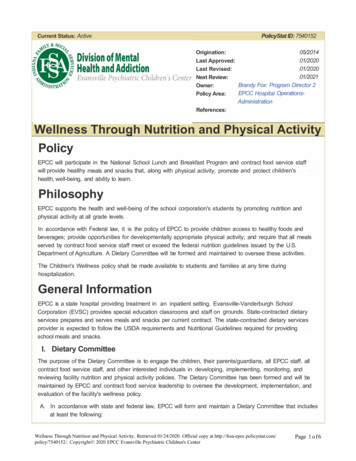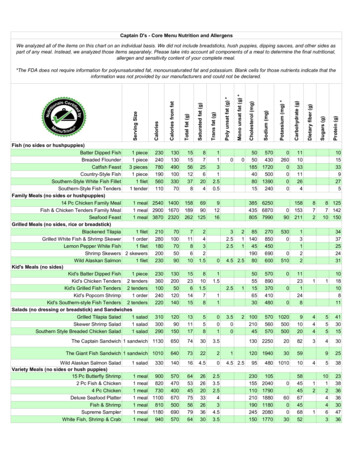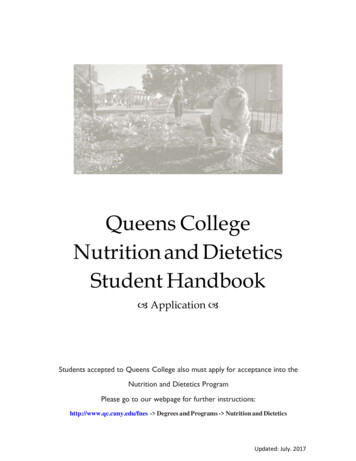
Transcription
Queens CollegeNutrition and DieteticsStudent Handbook Application Students accepted to Queens College also must apply for acceptance into theNutrition and Dietetics ProgramPlease go to our webpage for further instructions:http://www.qc.cuny.edu/fnes - Degrees and Programs - Nutrition and DieteticsUpdated: July. 2017
Table of ContentsQueens College Nutrition and Dietetics Program . 1Department and Program Missions . .1Accreditation . . . 1Admission. . . . . . .1Advisement . . . . . . . .1ACEND Core Knowledge Requirements . . 2Curriculum . 2Courses 3Prerequisite Course Sequencing .4Sample Nutrition and Dietetics Schedule 4Academic Calendar 5Course Descriptions .5Student Grading and Learning . . .8College Support Services . . .8Career and Education Opportunities . .9Employment and Education . .9Registered Dietitian Nutritionist . 9Policies and Procedures . .11Evaluation of Transfer Credits . 11Articulation Agreements . .11Second Bachelor Degree Students . .11International Students . .11Early (pre) Registration . 11Permits for Courses to be Taken Outside of Queens College . .12FNES Computer Lab . 12Academic Dishonesty . .12Grievances . . 12Disciplinary and Termination Procedures . .13Equal Opportunity and Non-Discrimination . .13Program Costs . 13Tuition . .13Dorming on Campus . .14Books . .14Lab Fees . 14Program Outcomes . . .14Application for the Undergraduate Nutrition and Dietetics Program. . 15
QUEENS COLLEGE NUTRITION AND DIETETICS PROGRAMDEPARTMENT and PROGRAM MISSIONSFamily, Nutrition, and Exercise Sciences (FNES) Department To prepare individuals to assume leadership roles in family and consumer sciences To create new knowledge through research and in- depth study of the respective disciplines To apply current knowledge to enhance the health and well-being of individuals, families, andcommunities in an increasingly global society.Nutrition and Dietetics Program To impart knowledge and develop in dietetics students the ability to solve problems and thinkcritically.ACCREDITATION The Nutrition and Dietetics program was reaccredited as a Didactic Program in Dietetics (DPD) onJanuary 29, 2016 by the Accreditation Council for Education in Nutrition and Dietetics (ACEND), 120S. Riverside Plaza, Chicago, IL 60606 (phone# 312/899-0040, ext. 5400);Academy of Nutrition and Dietetics www.eatrightPRO.org - ACEND and Accreditation.The program is also accredited by the Middle States Association of Colleges and Secondary Schools.ADMISSION For Admission to Queens CollegeApply to Queens College: www.qc.cuny.edu/admissions Jefferson Lobby, 718 997-5600For Admission to the Nutrition and Dietetics ProgramNutrition and Dietetics (N&D) major requires a 3.0 GPA for admission. To be accepted into theN&D program you must be accepted into Queens College and then apply for acceptance intothe N&D program. The Nutrition and Dietetics application is available on the last pages of thishandbook and on our NS/fnes/Programs/Pages/Dietetics.aspxADVISEMENT Nutrition and Dietetics AdvisementProgram Director: Patricia Miner, PhD, RDN, CDN. Remsen Hall, room 306Bpatricia.miner@qc.cuny.edu 718 997-4475Faculty Advisor: Sungeun Choi, PhD., RDN, Remsen Hall, room 305Asungeun.choi@qc.cuny.edu 718-997-4475 Department College AssistantsRemsen Hall, room 306, 718 997-4475Jennifer Tang (jennifer.tang@qc.cuny.edu) and Lucille DiMola (lucille.dimola@qc.cuny.edu) General Academic AdvisementFor information about college wide general education requirements, speak with an advisor in theAcademic Advisement Center, Kiely 217 Pathways information: gened.qc.cuny.edu/pathways Financial Aid, Loans, Loan Deferments, Grants, Work StudyContact the financial aid office for information about the various grants, work and loanprograms offered by New York State and the federal ges/default.aspx Jefferson Hall, room 203 718 997-5102 Office Of Honors & ScholarshipsFor information about scholarship opportunities. Honors Hall 16; 718-997-5502; fax 718-997-5498email: honors@qc.cuny.edu www.qc.cuny.edu/academics/honors/ scholarships Hours 9-5. Pre-Health Professions AdvisementStudents planning a career in medicine, dentistry, or veterinary medicine should see the college’sPre-Health Professions advisor, Science Building, B338, (718) 9975554,valli.cook@qc.cuny.edu1
ACEND CORE KNOWLEDGE REQUIREMENTS1. Research methodology, interpretation of research literature and integration ofresearch principles into evidence-based practice.2. Communication skills sufficient for entry into professional practice.3. Principles and techniques of effective education, counseling and behaviorchange theories and techniques.4. Governance of nutrition and dietetics practice, such as the Scope of Nutrition andDietetics Practice and the Code of Ethics for the Profession of Nutrition andDietetics; and interprofessional relationships in various practice settings.5. Principles of medical nutrition therapy and the Nutrition Care Process.6. Role of environment, food, nutrition and lifestyle choices in health promotion anddisease prevention.7. Management theories and business principles required to deliver programs andservices.8. Continuous quality management of food and nutrition services.9. Fundamentals of public policy, including the legislative and regulatory basis ofnutrition and dietetics practice.10. Health care delivery systems (such as accountable care organizations, managedcare, medical homes).11. Coding and billing of nutrition and dietetics services to obtain reimbursement forservices from public or private payers, fee-for-service and value-based paymentsystems.12. Food science and food systems, environmental sustainability, techniques offood preparation and development and modification and evaluation of recipes,menus and food products acceptable to diverse populations.13. Organic chemistry, biochemistry, anatomy, physiology, genetics, microbiology,pharmacology, statistics, logic, nutrient metabolism, integrative and functionalnutrition and nutrition across the lifespan.14. Cultural competence and human diversity; human behavior, psychology, sociologyor anthropology.CURRICULUMThe curriculum consists of 24 classes (80 credits) including biology, chemistry, psychology,science of nutrition, science of food preparation, medical nutrition therapy, nutrition research,lifecycle and community nutrition, nutrition education, counseling and food service managementcourses.2
COURSESPROFESSIONAL NUTRITION and DIETETICS REQUIREMENTSFNES 101. Science of Foods(P) 3cr.FNES 104. Social, Cultural and EconomicAspects of FoodsFNES 147. Family Relations3cr.FNES 203. Meal Planning & Meal Management Prerequisite: FNES 1013cr.FNES 260. Research Methods in NutritionPrerequisite: PSYCH 1073cr.FNES 263. Nutrition IPrerequisite: Chem. 102.3&102.1, PSYCH 1073cr.FNES 264. Nutrition IIPrerequisite: FNES 2633cr.FNES 275. Institutional ManagementPrerequisite: FNES 1013cr.3cr.FNES 300. Seminar in Nutrition and Dietetics: Prerequisite FNES 263Career AdvancementPrerequisite: FNES 101, FNES 263, PSYCHFNES 307W. Experimental Food ScienceFNES 337. Nutrition Counseling and EducationFNES 365. Nutrition AssessmentFNES 366. Medical Nutrition TherapyFNES 368. Life Cycle & Community NutritionFNES 378. Quantity Food Purchasing,Production & Equipment1cr.(P) 4cr.107Prerequisite: FNES 2633cr.Prerequisite or co-requisite: FNES 264, Chem. 103.3&103.1Prerequisite: Chem.103.3&103.1, FNES 264 &365Prerequisite or co-requisite FNES264Prerequisite: FNES 203 & 2753cr.3cr.3cr.3cr.PROFESSIONAL PSYCHOLOGY REQUIREMENTSPsych 101. General Psychology(P) 4cr.Psych 107. Statistical Methods(P) 4cr.SCIENCE REQUIREMENTSChem 101.3/101.1. Basic Chemistry* (P) 4cr.Chem 102.3/102.1. Basic Organic ChemistryPrerequisite: Chem. 101.3&101.1* (P) 4cr.Chem 103.3.103.1. Basic BiochemistryPrerequisite: Chem. 102.3&102.1(P) 4cr.Bio 11. Introduction to College Biology*(P) 4cr.Bio 43. Anatomy & PhysiologyPrerequisite: Bio. 11 and Chem. 102.3&102.14cr.Bio 44. Food and Human MicrobiologyPrerequisite: Bio 11 and Chem. 102.3&102.14cr.* Alternative Courses: CHEM.113 CHEM.101.3/101.1; CHEM.251/252 CHEM.102.3/102.1; BIO.105 BIO 11(P) Pathways-General Education CoursesCHOICES OF REQUIRED - 3 CREDIT ELECTIVE COURSE1.FNES 105. Food Sustainability:2.Understanding the Food SystemFNES 200. Principles of Food Safety &Sanitation for Servsafe Certificate3.4.ANDFNES 372.1.Fieldwork in NutritionFNES 204. International CuisineFNES 345.Theories of Lifespan Development3cr.Prerequisite or co-requisite: FNES 1012cr.Prerequisite: FNES 101.Prerequisite: FNES 1471cr.3cr.3cr.3
PREREQUISITE COURSE SEQUENCING1. Psych107, Chem101 Chem102 FNES 263 FNES264 & Chem103 & FNES365 FNES366FNES 2602.3.4.5.FNES 337FNES 368 (Bio 43 prerequisite also needed)FNES 307 (FNES 101 prerequisite alsoneeded)FNES 300FNES 101 FNES 203 & FNES 275 FNES 378FNES 101 FNES 200, 204 (elective options)Bio11 & Chem102 Bio 43 and Bio 44No prerequisites needed for FNES 101,104,105,147,372.1, Psych 101, Psych 107, Bio 11,Chem 101SAMPLE NUTRITION AND DIETETICS SCHEDULEThe 120 total credits needed to earn a bachelor’s degree include the Nutrition and Dietetics courses(80 credits) and the required General Education and Electives courses (40 credits).Year 1Year 2Year 3Year 4FALLGeneral Education CourseGeneral Education CourseGeneral Education CourseGeneral Education CourseElectiveSemester TotalTotal3 CR3 CR3 CR3 CR3 CR15 CR15 CRFALLFNES 101Psych 107Chem 101.3/101.1Psych 101General Education Course3 CR4 CR4 CR4 CRSemester TotalTotal15 CR45 CRSemester TotalTotal3 CR3 CR4 CR4 CR3 CR17 CR62 CRSemester TotalTotal3 CR3 CR3 CR4 CR2 CR15 CR77 CRSPRINGFNES 264FNES 275FNES 368Chem 103.3/103.1 General Education CourseApproved FNES ElectiveSemester TotalTotal3 CR3 CR3 CR4 CR3 CR15 CR92 CRSPRINGFNES 307WFNES 366Bio 44Elective4 CR3 CR4 CR3 CRGeneral Education CourseGeneral Education CourseFALLFNES 263FNES 260FNES 147Bio 43ElectiveFALLFNES 365FNES 378FNES 337FNES 300Elective3 CR3 CR3 CR2 CR3 CRSemester Total 14 CRTotal 106 CRSPRINGGeneral Education CourseGeneral Education CourseGeneral Education CourseGeneral Education CourseElectiveSemester TotalTotalSPRINGFNES 203FNES 104Bio 11Chem 102.3/102.1ElectiveGeneral Education CourseGeneral Education Course3 CR3 CR3 CR3 CR3 CR15 CR30 CRSemester Total 14 CRTotal 120 CR4
ACADEMIC CALENDARThe academic calendar provides the start and end of the Fall, Spring, Summer and Winter semestersalong with registrar deadline dates and upcoming campus-wide events at www.qc.cuny.edu/calendarCOURSE DESCRIPTIONSFNES CoursesFNES 101. The Science of Foods. 2 class hr., 3 lab hr.; 3 cr. Chemical and physical properties of foods thataffect handling, preparation, and storage. MATERIAL charge, 105. Fall, SpringFNES 104. Social, Cultural, and Economic Aspects of Foods. 3 hr.; 3 cr. Multidisciplinary study of world foodpatterns and nutritional implications in various cultures. Fall, SpringFNES 147. Family Relations. 3 hr.; 3 cr. Interpersonal relations in contemporary American marriage and familylife. Topics include dating, courtship, sex attitudes and behavior, family preplanning, communication, maritalconflict, the unmarried, and elements of a successful marriage. Fall, SpringFNES 203. Meal Planning and Meal Management. 2 class hr., 3 lab hr.; 3 cr. Prerequisite: FNES 101, orpermission of the department. Understanding the meaning of foods in family meals, and basic principles of mealplanning, preparation, and service effectively using money, time and energy. MATERIAL charge 95. Fall, SpringFNES 260. Research Methods in Nutrition. 3 hr.; 3 cr. Prereq.: Psych 107. Understanding research methods anddesign with a focus on the interpretation and evaluation of research in the role of diet and nutrition in healthpromotion. FallFNES 263. Nutrition I. 3 hr.; 3 cr. Prerequisite: CHEM 102, Psychology 107. A study of carbohydrate, lipid,protein, and energy requirements; the utilization of nutrients in the body; and the application of nutritionalprinciples. Fall, SpringFNES 264. Nutrition II. 3 hr.; 3 cr. Prerequisite: FNES 263. A study of vitamin and mineral requirements; theutilization of nutrients in the body; and the application of nutritional principles. Fall, SpringFNES 275. Institutional Management. 3 hr.; 3 cr. Prerequisite: FNES 101. An overview of the food serviceindustry, and of theories and strategies of management. Topics to be discussed include staff selection &supervision, budget development, resource allocation, marketing and merchandising, and sanitation and safety.Fall, SpringFNES 300. Seminar in Nutrition and Dietetics: Career Advancement. 2 hr.; 2 cr. Prereq.: FNES 263.Development of career skills and resources for advancement in the profession of nutrition and dietetics includingportfolio development, governance of nutrition and dietetics practice, such as the Code of Ethics for the professionof Nutrition and Dietetics, and the regulations related to billing, coding, and reimbursement of nutrition services.Fall, SpringFNES 307W. Experimental Food Science. 5 hr.; 4 cr. Prerequisite: FNES 101 and 263, PSYCH 107. Techniquesin food experimentation. The completion of an individual food study requiring interpretation and evaluation ofresults. MATERIAL charge, 85. Fall, SpringFNES 337. Nutrition Counseling and Education. 3 hr.; 3 cr. Prerequisite: FNES 263. An overview of nutritioneducation and counseling, introduces nutrition students to learning and behavior change theories, and practice inapplying and evaluating techniques to support behavior change. Fall, SpringFNES 365. Nutrition Assessment. 2 class hr., 2 lab hr.; 3 cr. Prereq. or Coreq.: CHEM 103.1, 103.3, FNES264, and Bio 43. Introduction to nutrition assessment and other components of medical nutrition therapy,utilizing the nutrition care process. Fall, SpringFNES 366. Medical Nutrition Therapy. 3 hr.; 3 cr. Prereq.: FNES 264 and 365. Nutrition and dietarytreatment of pathological medical conditions. Fall, Spring5
FNES 368. Life Cycle and Community Nutrition. 3 lec. hr.; 3 cr. Prereq. or Coreq.: FNES 264. Understand thenutrition needs and government programs to support nutrition health during the different stages of the life cycle;community needs assessment; explain the impact of public policy on nutrition and dietetics practice. Fall, SpringFNES 378. Quantity Food Purchasing, Production, and Equipment. 3 hr. and practicum; 3 cr. Prerequisite:FNES 203 and 275. This course includes institutional menu planning and purchasing, inventory control, production,and distribution. Topics will include layout and design, equipment selection, and compliance with codes andstandards. Fall, Spring20 HOURS OF FIELDWORK IN A NURSING HOME, HOSPITAL, OR AN ASSISTED LIVING FOOD SERVICEDEPARTMENT IS REQUIRED DURING THE SEMESTER THE COURSE IS TAKEN. YOU SHOULD FIND THESITE PRIOR TO THE START OF THE SEMESTER. AN ALTERNATIVE TYPE OF SITE MUST BE PREAPPROVED BY THE INSTRUCTOR THE FIRST DAY OF CLASS.Psychology CoursesPSYCH 101. General Psychology. 4 hr.; 4 cr. An introduction to the chief facts, principles, methods, and theoriesof psychology. Topics discussed include the history of psychology, sensory and perceptual processes, motivationand emotion, behavior development, learning and cognition, psychometrics, personality, psychopathology, andsocial behavior. Not open to students who have taken PSYCH 102 (currently on reserve). This course requires aresearch experience of up to 5 hours. This experience can consist of participation in research studies or shortwritten reports of published psychological research. Fall, Spring, SummerPSYCH 107. Statistical Methods. 4 lecture/lab. hr.; 4 cr. Prerequisite: Demonstration of current mathematicalcompetency equivalent to 2-1/2 years of high school mathematics as defined by performance on the QueensCollege Mathematics Placement Exam. This mathematics prerequisite may also be fulfilled by evidence ofsatisfactory completion of one or more of the following courses: MATH 110 or 122 (or their equivalents). Datareduction, analysis, and reporting of frequency distributions, curve fitting, correlation, estimation, and hypothesistesting on evidence from one, two, and three or more samples and from factorial designs including interaction.Fall, SpringChemistry and Biology CoursesCHEM 101.3. Basic Chemistry. 2 lecture, 1 rec. hr.; 3 cr. Co-requisite: CHEM 101.1. The first of a threesemester sequence intended for students planning careers in allied health fields such as nutrition, dietetics, andnursing or in elementary education. This course is also useful as an overview for students with limited exposure tochemistry or physics before enrolling into CHEM 113.4. Topics include the scientific method, elements andchemical compounds, the phases of matter, chemical reactions and stoichiometry, chemical dynamics, solutionchemistry, and nuclear chemistry. The relationship between chemistry and society is discussed. Fall, Spring,SummerCHEM 101.1. Basic Chemistry Laboratory. 3 lab hr.; 1 cr. Prerequisite. or co-requisite: CHEM 101.3.Introduction to techniques used to measure substances, to separate substances from a mixture, and to followphysical and chemical changes during chemical reactions with emphasis placed on direct observation. Fall,Spring, SummerCHEM 102.3. Basic Organic Chemistry. 2 lecture, 1 rec. hr.; 3 cr. Prerequisite: A grade of C or better in CHEM101.3 and 101.1 (or 113.4 and 113.1 or 114.4 and 114.1). Co-requisite: CHEM 102.1. The second of a threesemester sequence intended for students planning careers in allied health fields such as nutrition, dietetics, andnursing. This course represents a one-semester survey of organic chemistry with a focus on the areas of organicchemistry that are fundamental to understanding the chemical reactions that occur in living systems. Not open tomajors in the chemistry, biochemistry, and chemical education concentrations. Fall, SpringCHEM 102.1. Basic Organic Chemistry Laboratory. 3 lab hr.; 1 cr. Prerequisite: A grade of C or better in CHEM101.3 and 101.1 (or CHEM 113.4 and 113.1 or CHEM 114.4 and 114.1). Prerequisite or co-requisite.: CHEM102.3. Introduction to organic chemical techniques and synthesis of selected organic molecules with functionalgroups that are important in biology and nutrition. Fall, Spring6
CHEM 103.3. Basic Biochemistry. 2 lecture, 1 rec. hr.; 3 cr. Prerequisite: A grade of C or betterin CHEM 102.3 and 102.1; co-requisite.: CHEM 103.1. The third of a three-semester sequence intended forstudents planning careers in allied health fields such as nutrition, dietetics, and nursing. This course presents astudy of the structure, properties, and metabolism of the major groups of biological importance, with specialemphasis on the role of those compounds required in diet. Not open to majors in the chemistry, biochemistry, orchemical education concentration. Fall, SpringCHEM 103.1. Basic Biochemistry Laboratory. 3 lab. hr.; 1 cr. Prerequisite: A grade of C or better in CHEM102.3 and 102.1. Prerequisite. or co-requisite CHEM 103.3. Introduction to a variety of basic biochemical methodsincluding enzymology, calorimetry, and chromatography used to examine metabolic processes. Fall, SpringBIOL 11. Introduction to College Biolo
Nutrition and Dietetics (N&D) major requires a 3.0 GPA for admission. To be accepted into the N&D program you must be accepted into Queens College and then apply for acceptance into the N&D program. The Nutri

